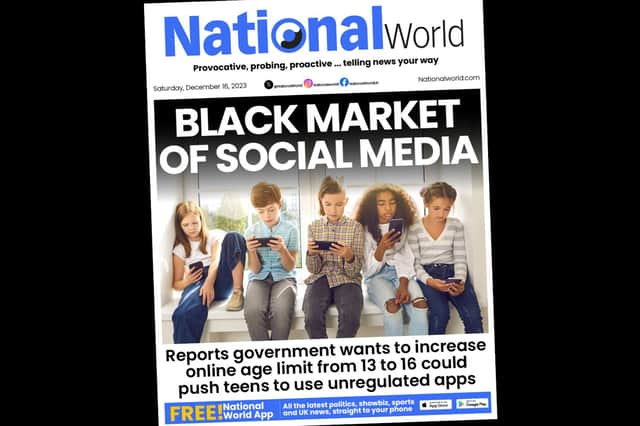Banning children won’t fix social media’s problems - they deserve to be safe online


“The government doesn't look to ban things for the sake of it - this is just speculation,” Rishi Sunak’s spokeswoman told me, sending my eyebrows into my hairline.
She was responding to questions about a Bloomberg story that said Rishi Sunak was looking to increase the age limit for social media from 13 to 16. This was briefed out shortly before the Prime Minister was accused by parents, whose children’s deaths were linked to social media and gaming, of betraying them by watering down online safety legislation. Perhaps the timing was just a coincidence.
Advertisement
Hide AdAdvertisement
Hide AdNoticeably there was no denial. Maybe Sunak wants to go into the next election having banned children from cigs, vapes and Instagram. So if it wasn’t a distraction, the question is is it a good idea? Will raising the age limit from 13 actually keep children safer on social media, or might tech companies use it as an excuse to leave it as an unregulated wild west.
Many people - maybe even the Prime Minister - will say that the answer to the evils of social media is just to keep children away. Banning youngsters from accessing Instagram, Snapchat and TikTok will stop them from seeing harmful content and fall victim to bullies, trolls and predators.
That’s great - but is it realistic? Adults successfully stopping teenagers from doing anything, never mind going online, seems quite far-fetched. Underage drinking and smoking is against the law and yet it still happens everywhere. Five-year-olds have hacked their fathers’ Xbox and YouTube accounts, and Ofcom research found that a third of children have a user age of 18+.
So it seems unlikely generations brought up in the digital age will be kept off social media. Instead, with a higher age limit and platforms less inclined to make themselves safe for children, youngsters might access even less appropriate content.
Advertisement
Hide AdAdvertisement
Hide AdTech companies also think it will be tricky to implement. Under 16s often don’t have identification documents, and there’s also the difficulty of proving you’re someone’s parent. And after all, it was only two months ago that the government passed the Online Safety Act, an incredibly wide-ranging piece of legislation that was five years in the making. This puts more onus on tech companies to police content and will bring in age estimation and verification after a consultation next year.
Campaigners, who you might expect to be in favour of bumping the age limit to 16, would rather wait to see this in full effect. Baroness Beeban Kidron, founder of the 5Rights Foundation and one of the key architects of the act, thinks exactly this. “To automatically kick kids off is not necessarily the right answer,” she said. “I think that the government should not keep on introducing new things and implement the old.”
Mum Rachel Beech broadly agrees: “Even if 13 is the right age it needs to be enforced and that’s the challenge - we’ve already got these age limits but no one is paying attention to them.
Rachel thinks a lot about the safety of tech platforms. Firstly as a mother, she allows her 12-year-old son to use WhatsApp for communication but not any other social media. Secondly as the founder of We Are Fetching, a start-up designed to help parents safely organise the school run.
Advertisement
Hide AdAdvertisement
Hide AdEvery member has to be verified for safeguarding reasons, and the 43-year-old thinks this should be rolled out across all social media platforms. “I believe in ID verification for everyone, the amount of trolling and abuse online is ridiculous,” she tells me.
And Rachel knows children will find a way: “The kids are up on the adults, they know how to do these things … they want to be on these platforms because their friends are. The tech companies think they’ve covered themselves but actually they need to take a bigger step. You either regulate the content or make sure everyone is old enough to engage with it. We are creating more and more of this online existence, so we need it to mirror the real world.”
To me it feels like a matter of principle. The online world isn’t optional for children growing up now as it was a generation ago, they even spent the whole of the pandemic learning and socialising virtually. So it follows that these spaces need to be made safer for them.
If Sunak really believes this would be effective, it’s odd he didn’t include it in his government’s landmark online safety legislation, which was only passed two months ago. Perhaps he’s just found another “long-term decision for a brighter future” down the back of the No10 sofa.
Advertisement
Hide AdAdvertisement
Hide AdRalph Blackburn is NationalWorld’s politics editor based in Westminster, where he gets special access to Parliament, MPs and government briefings. If you liked this article you can follow Ralph on X (Twitter) here and sign up to his free weekly newsletter Politics Uncovered, which brings you the latest analysis and gossip from Westminster every Sunday morning.
Comment Guidelines
National World encourages reader discussion on our stories. User feedback, insights and back-and-forth exchanges add a rich layer of context to reporting. Please review our Community Guidelines before commenting.
